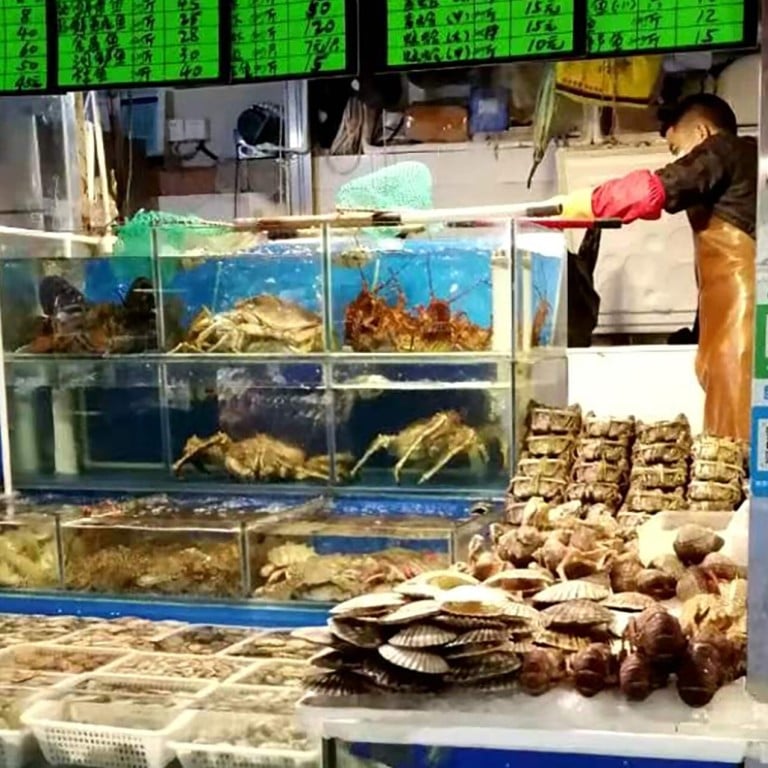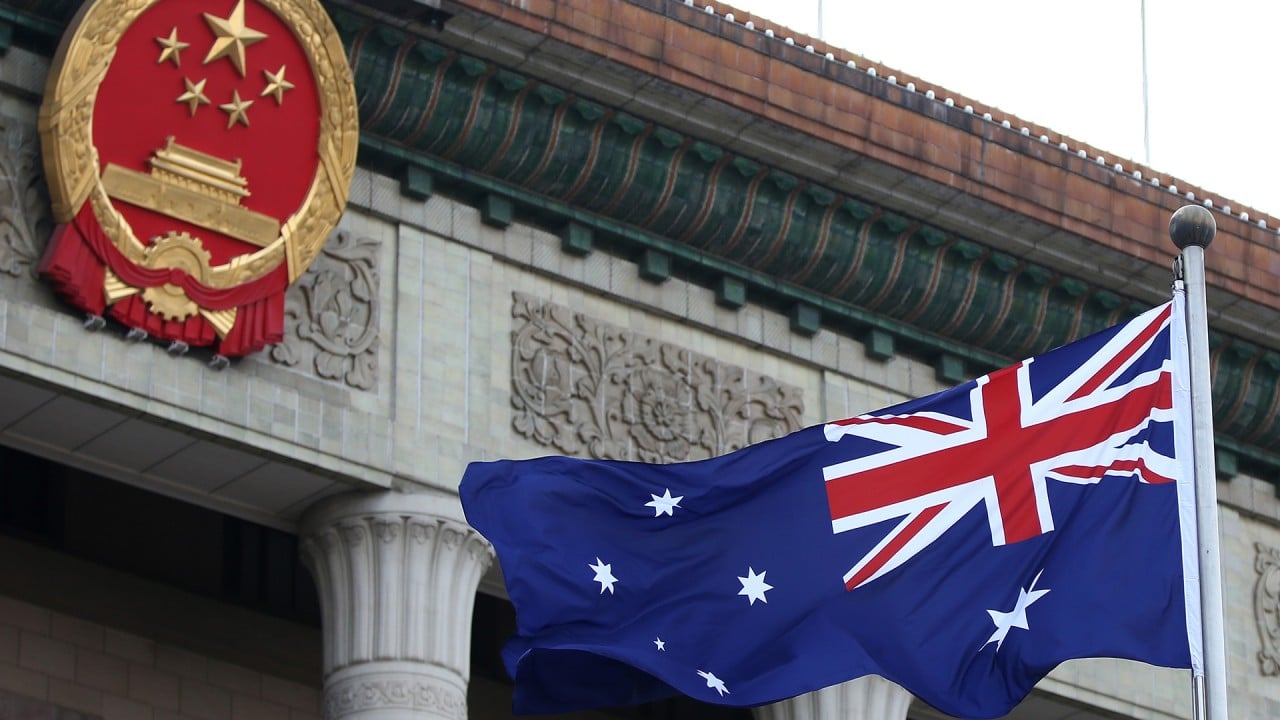
China-Australia relations: import ban sees Australian lobster disappear from Beijing markets, restaurants
- Australian rock lobster has all but disappeared from markets and restaurants in Beijing since China imposed an import ban last month
- Vendors in the capital have started stocking lobster from other countries, while the price of live lobsters in Australia has plunged
In Beijing’s bustling Sanyuanli market, a few Australian rock lobsters swim in tanks as vendors make a last-ditch effort to sell the crustaceans that are fast disappearing from Chinese menus.
“We are selling our remaining stock and if you don’t buy them now, you won’t get your hands on them any time soon,” said one stallholder, adding he also had frozen lobsters but the live ones were most prized, especially for celebratory banquets.
Another trader at the market, which is renowned for its imported seafood, said she was getting mixed signals about the supply of live Australian rock lobsters from her local importer.
“It’s not clear if we are able to get them in the coming weeks … there is no guarantee,” she said.

07:55
Australia ditched diplomacy for ‘adversarial approach’ to China and ‘a pat on the head’ from US
Amid the uncertainty, vendors at Sanyuanli market have moved on to stock lobsters from Boston as an alternative to the Australian variety, which have been staple at wedding banquets and parties over the past 10 years.
“Some customers are disappointed,” said one Sanyuanli seafood store owner, adding Australian rock lobster, often steamed and presented on a big plate, is considered a luxury dish. “Here in Beijing they like to serve Australian lobsters when inviting guests for dinner. They are large, you see, they look nice on a dinner table.”
Australian lobsters are not the only casualty in the two countries’ escalating row. Australian coal, copper, sugar, logs, barley and wine were also blocked, although the Chinese government never formally announced the bans.

Over the course of November, however, Chinese authorities found pests in log timber shipments and said Australian coal shipments had failed environmental standards.
The Australian lobster gained fame in China after tariffs were cut to zero following the signing of the China-Australia Free Trade Agreement in 2015. Before the ban, more than 90 per cent of Australian rock lobsters were exported to China, where the market was worth about A$750 million (US$553.7 million) a year.
The shellfish, Australia’s most valuable fishing export, is popular for its tough texture and saltier, fishier flavour, Chinese retailers told the South China Morning Post. As a result, live Australian rock lobsters are priced three times that of the Boston lobster.
But the once-lucrative market is dead for Australian businesses, according to a Sydney-based exporter who sells live lobsters from South Australia to restaurants in Shanghai.
China-Australia relations: what has happened over the last seven months?
The price of live lobsters in Australia was now roughly US$30 a kilogram, falling nearly 70 per cent from its usual price of US$100 a kilogram at this festive time of year, said the exporter, who did not want to be named.
Demand from China usually peaked between October and March when festive celebrations and the all-important Lunar New Year took place.
But with supply curtailed this year, demand has responded accordingly and consumers have turned to lobsters from other countries. Aside from Chinese demand, the price of lobster also rises when local demand peaks over celebrations like Christmas.
“In China you can now buy lobsters from all over the world, so instead of Australian lobsters, people can not only buy Boston lobsters, but those from Cuba, New Zealand, the Caribbean, South Africa and Mozambique,” the exporter said.
Demand for lobster was elastic not just because of the options available, but because it was a discretionary item, he added.
“Not many people know the difference between types when you put cooked lobster on the plate,” he said. “The lobster is a luxury meal, coveted at weddings and dinners, but it’s something Chinese diners can do without everyday.”
Store owners at Sanyuanli market agreed, saying the loss of Australian lobsters was not a big blow to business because they had plenty of other seafood to sell.
Some restaurants in Beijing’s business district have already started taking the crustacean off the menu.
“We are currently offering a third off Australian rock lobsters,” said a waitress in a seafood restaurant in Beijing’s Chaoyang district.
“I don’t know if we are going to get more stock after the offer period, [but] I recommend our Alaskan king crabs if you haven’t tried it. They are also popular.”

01:58
Salmon import ban and partial lockdown for Beijing after new Covid-19 cases in Chinese capital
While local vendors look for alternatives, it is too early to tell if they have filled the gap left after Australian exports were banned. Export numbers have also been muddied as coronavirus restrictions threw global trade into bedlam.
Mark Edwards, chief executive of the New Zealand Rock Lobster Industry Association, said there had not been an increase in lobster exports from his country after the Australian ban was imposed on November 6, although the industry had a “reasonable November” after the slowdown caused by the pandemic.
Despite that, New Zealand Trade & Enterprise, the government’s international business development agency, said recently that the outlook for seafood exports to China remained positive. About 35 per cent of New Zealand’s seafood is exported to China.
Some Chinese importers and distributors are hesitant to take on or purchase any Australian brands and products due to the recent bans
The Lobster Council of Canada said it could not confirm whether the ban on lobster from Australia, a direct competitor, had helped exports because data from last month was unavailable.
In the meantime, Australian exporters across the board continue to adjust to the changing trade environment.
“Some Chinese importers and distributors are hesitant to take on or purchase any Australian brands and products due to the recent bans,” said Sara Cheng, executive director at Sydney-based trade and investment consultancy China and Beyond.
“Some Australian small and medium enterprises, which have not yet succeeded in the China market, have also decided to quit.”
But not everyone is as risk averse, with a number of major brands and new entrants viewing it as an opportune time to break into the market with fewer competitors, she said.

07:34
Australia and China cooperation too valuable for 'nonsensical' decoupling
While Australian lobster exporters grapple with the loss of business, diners at home are likely to be big winners, with prices for the local delicacy tumbling in the lead up to Christmas.
Ferguson Australia, a leading supplier of Australian southern rock lobster that had shipments detained in Shanghai last month, partnered with a local supermarket this week to give local buyers a discount of A$50 (US$37) a kilogram for the shellfish.
Though not as lucrative as China, the local market had picked up some of the losses incurred as result of the ban, the company’s managing director Andrew Ferguson said.
Local fishermen had begun controlling catches – which also promoted more sustainable fishing – while the industry slowly diversified to other markets, he said.
“It is disappointing that there isn’t a better trading relationship with China,” Ferguson said. “We are sympathetic and friendly and we want to do business with China.”


